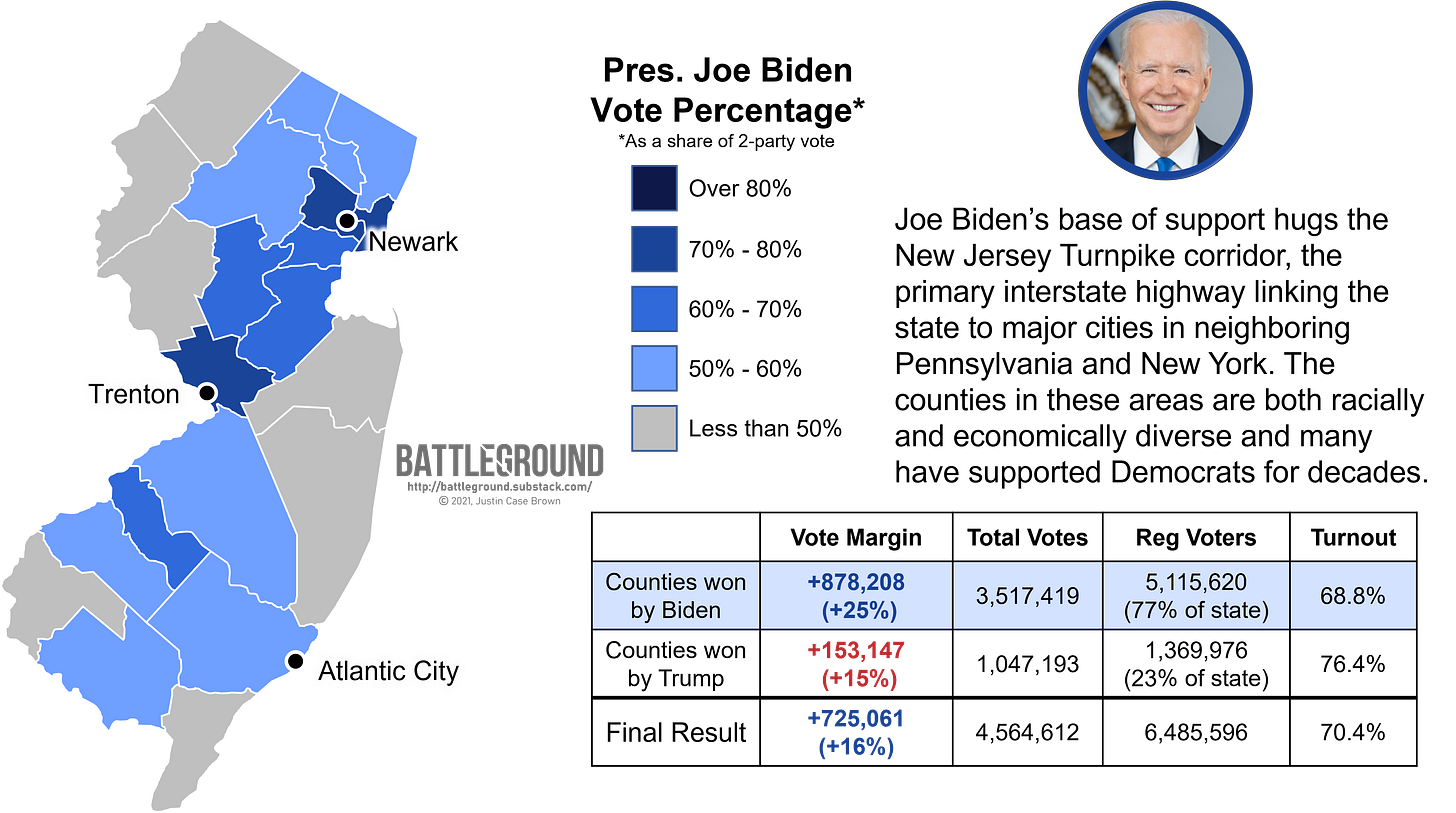New Jersey: Turnpike vs. Parkway
New Jersey's map holds a thick blue vein down its center, forcing red into its corners.
Topline Takeaways
Pres. Joe Biden beat Trump by a wide 15-point margin by stringing together wins along the state’s centralized urban corridor.
Donald Trump won in the counties along the state’s outskirts, most of which are Whiter than the state as whole.
While small Republican enclaves continue to thrive within New Jersey, Democrats continue to consolidate power with persistent wins in statewide elections.
In-Depth Insights
Joe Biden’s base of support in New Jersey primarily hugs the New Jersey Turnpike: running through the central, urban areas of the state. The turnpike crosses through the state’s two most populated regions: the state’s “Gateway” region across the Hudson River from New York City and the New Jersey suburbs of Philadelphia across the Delaware River. This corridor is both economically and racially diverse. Nonwhite residents of various ethnicities make-up a majority in many of these counties, with Asian and Hispanic residents voting in large numbers in Middlesex and Hudson counties respectively. Mercer county, also won by Biden, holds many townships with radically different household incomes: Trenton has a median income of about $34,000 and West Windsor township, 11 miles to the northeast, has a median income 5 times that of Trenton at roughly $175,000 and is among the highest in the state.
One major political issue that’s particularly important to New Jersey voters in this corridor is public transit. When ranking states based on the percentage of the population that utilizes public transit to get to work (pre-pandemic) New Jersey ranks second in the nation behind New York. Much of this transit is forced under the Hudson River through tunnels that have been in desperate need of repair since Hurricane Sandy flooded these tunnels in 2012. Donald Trump inherited the Gateway Program, a major revitalization project that was launched under President Obama, and the Trump administration regularly stalled progress on the much needed tunnel upgrades. Riders aboard these trains have endured regular delays as a result of the deteriorating tunnel conditions and their frustrations likely influenced their vote...
Donald Trump’s base of support fell in counties that were Whiter and more rural than the rest of the state. He won every county where Whites makeup over 80% of residents. Many of these counties have been voting for Republicans for decades. In the northwestern corner of the state, Sussex and Warren counties have voted for Republican presidential candidates in every single election since Lyndon B. Johnson swept all of the state’s counties in 1964.
The North Shore region is the only region Trump won outright and is home to the Garden State Parkway. It is comprised of Monmouth and Ocean counties, areas that have been reliably red due to a lack of organization among local Democrats. This is also due to the large Orthodox Jewish population that straddles these two counties in Lakewood, NJ. The township is home to the largest yeshiva outside of Israel and is filled with religiously-motivated, conservative voters. Donald Trump also held on to southern Salem county (lying across the Delaware River from Wilmington, DE), a county he originally flipped in 2016 that has recently seen declines in its population.
Forecasting the Future: While Republicans have won both local and statewide contests in recent years, the national Republican party’s hard-right lean on social issues has alienated many of New Jersey’s voters. Republicans in New Jersey historically have only been fiscally conservative and instead held moderate views on social issues.
As Phil Murphy vies for re-election in the upcoming gubernatorial election this November, his opponent Jack Ciattarelli has been keeping his distance from Donald Trump, a rare move within a party that has rewarded Trump loyalists over defectors in recent years. The complicated calculus for Ciattarelli is how he plans to court moderate swing voters who dislike Trump without losing too much of the Trump loving base. The top ranking Republican on the New Jersey General Assembly, Jon Bramnick, flirted with the possibility of running as a moderate Republican gubernatorial candidate and didn’t think he could rise to the challenge.
“I traveled around the state and I saw a very strong contingent of Republicans who were very strong for Trump, and I didn’t think I could get enough of the base. I’m never going to go out there and be a Trump supporter — it wouldn’t be authentic, and nobody would believe it.” - Jon Bramnick, minority leader of the NJ General Assembly






